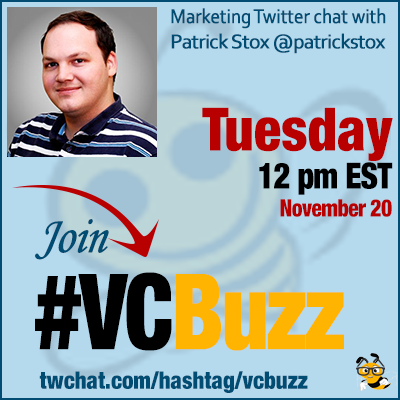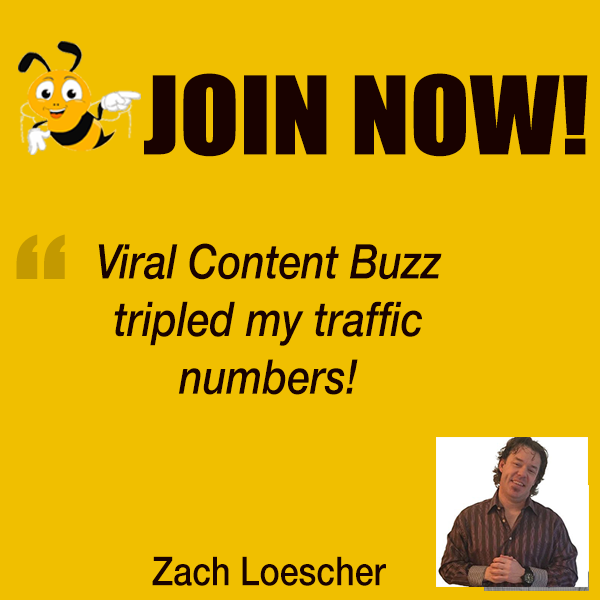 Most of publishers are aware of rel=”nofollow” link attribute by now. From being SEO thing only, it has got a wide application throughout the Internet. But how to use it correctly?
Most of publishers are aware of rel=”nofollow” link attribute by now. From being SEO thing only, it has got a wide application throughout the Internet. But how to use it correctly?
Let’s discuss!
***Add #VCBuzz chats to your calendar here.
***Please sign in here to follow the chat -> twchat.com/hashtag/vcbuzz
About @patrickstox
Patrick Stox @patrickstox is a Technical SEO for IBM.
Patrick is an organizer for the Raleigh SEO Meetup, the most successful SEO Meetup in the US, and also the Beer & SEO Meetup.
Patrick is a contributing author for Search Engine Land, Marketing Land, and Search Engine Journal and also speaks at search conferences like #SMX and #Pubcon.
Questions we discussed
Q1 How did you become a digital marketer? Please share your career story!
I started as an affiliate, became a developer, transitioned to marketing (traditional + digital in house at a mid-size company) where I found out I really liked SEO, I ran my own search company for a while, worked for a local SEO company, and now I work at IBM.
@patrickstox why did you stop doing affiliate marketing? Is it less fun / effective / easy these days? #vcbuzz
— Jessy Troy (@jessytroy) November 20, 2018
Who says I stopped? 😉 It’s more work these days but I’d say it almost feels less competitive. There are more people competing, but the skillset required is greater than ever before.
How did you handle the transition of working for yourself with your goals vs working for a company? #VCBuzz
— Bernie Fussenegger ?✌️the7️⃣ (@B2the7) November 20, 2018
It wasn’t a hard transition, I was bored of working in a dark room by myself. Time management is key I would say.
Q2 So what exactly is nofollow link attribute and how does it work?
Essentially, it says not to follow links on a page or can be used for specific links. This stops them from being crawled (from that location) but also stops value from passing through the links.
A2 nofollow tells Google (and other SEs that joined) that a link should influence rankings which I personally think is a terrible idea #vcbuzz
— Ann Smarty (@seosmarty) November 20, 2018
I have liked to used no follow in the past for pages that I had specific reasons for not being indexed – mainly for testing reasons #VCBuzz
— Bernie Fussenegger ?✌️the7️⃣ (@B2the7) November 20, 2018
But it doesn’t stop them from being crawled or indexed. They might be listed somewhere else or linked to. Just stops them from being crawled from that single location.
There has been a lot of debate on this and I lost track what Google reps ended up confirming RT @jessytroy Do you believe in a statement that the more links can be followed off the page, the less value is distributed to each of them #vcbuzz
— Ann Smarty (@seosmarty) November 20, 2018
Recent debate, Ann? @seosmarty Or long ago? I thought it was accepted that link sculpting does not work anymore and the value of the page is divided among ALL links not just followed links? #vcbuzz
— Gail Gardner (@GrowMap) November 20, 2018
Maybe a bit, but it’s not something I typically worry about. Google says to keep the number to a reasonable amount, “a few thousand at most”
a2 The no follow link tag – essentially is the link with no ❤️- you're telling the engines to skip over it & not bolster your page credibility. At least that's how I see it. #VCBuzz
— Debi Norton (@BRAVOMedia1) November 20, 2018
Q3 What are some of the most widespread mistakes publishers need to avoid when using rel=”nofollow”? When should we consider using it?
The biggest mistake is using nofollow at a page level. Not only do bots not crawl the links going out, but they don’t crawl or pass value to your internal links either. I also see people nofollow for all links out from a website.
A3 Nofollowing internal links #vcbuzz
— Gail Gardner (@GrowMap) November 20, 2018
I could never get this… If you don't want a page top be accessed, put it in Robotstxt. If you don't want a page to rank, use NOINDEX tag. Why would anyone nofollow on a link level? RT @GrowMap: A3 Nofollowing internal links #vcbuzz
— Ann Smarty (@seosmarty) November 20, 2018
You should use nofollow when you can’t trust the people posting such as in user generated content sections, for paid links, or sometimes for crawl prioritization like with login pages.
RE: for crawl prioritization @patrickstox I'd really recommend other methods, like Robotstxt and Robots meta tags though #vcbuzz
— Ann Smarty (@seosmarty) November 20, 2018
Nuances. robots.txt doesn’t stop it from being indexed, just crawled. Then if you block in robots, a noindex won’t be seen/respected. Pretty much nofollow should be used on a link level only in my opinion.
A3 If you really have to, nofollow comment links, links in forums… In most cases though, my own rule of thumb, if I don't trust the link, I won't link… #vcbuzz
— Ann Smarty (@seosmarty) November 20, 2018
I think you just covered both sides, when you’re in control vs when you’re not. That’s a great rule for when you can control it, but when others control it those should likely be nofollowed unless you trust the people adding the content.
Q4 What are other (better? worse?) ways to control how search bots crawl links and assign quality signals to them?
Robots.txt, directives (on page + header responses) sitemaps, internal and external links, canonical, pagination, javascript, alternate versions (mobile/amp), hreflang, authentication, URL parameter tool in Google Search Console, etc. It gets complex fast!
Right, but blocking crawling in robots.txt would prevent them from seeing a page marked noindex. If they aren't allowed to crawl, they can't see the noindex tag, so a page blocked from crawling with a noindex tag on it may still get indexed. #vcbuzz
— Patrick Stox (@patrickstox) November 20, 2018
Yes. Basically you have to pick one or the other. Do you want the page not crawled, or not indexed? Because it’s pretty much impossible to have both unless there are zero links (including internal) pointing to the page. #vcbuzz
— Jenny Halasz (@jennyhalasz) November 20, 2018
A4 If you REALLY want a page to vanish from search + crawlers to stay away from it (to save crawlers' time), use Robotstxt + URL removal tool: https://t.co/yG4GqzFmxD #vcbuzz
— Ann Smarty (@seosmarty) November 20, 2018
So much this. Nofollow at a page level gets used way too much because people don't understand it also stops crawling of your internal links and passing value through your own website. There are better ways, like automated tagging at the link level. #vcbuzz
— Patrick Stox (@patrickstox) November 20, 2018
Paid links, UGC like forums, spam, q&a. A lot of times this is already automated by a CMS like WordPress comments, but some systems have to be done custom to not allow these links to be followed. Ideally you’d never have to worry about it.
Q5 What are your favorite SEO tools, especially those that help us understand how search crawlers see and use our website?
For crawlers, DeepCrawl, Screaming Frog, ContentKing, Ryte, Sitebulb, Botify, OnCrawl. Some of those also include log file analysis options with someone of a search slant, but I’ll also mention Splunk and logz.io
Some great Google tools include the Index Coverage report inside the new Google Search Console which classifies different problems on pages. Fetch and Render in GSC, rich results tester, mobile friendly tester can all be helpful when dealing with JavaScript as well.
a5 GREAT Question!
– Google Search (Site: InUrl: links:)
– G Analytics
– G Search Console
– G Ads (4 actual search terms)
– Screaming frog
– Rex Swain
– Deep Crawl
These are a few of my favorites #VCBuzz— Debi Norton (@BRAVOMedia1) November 20, 2018
@patrickstox Thanks so much for the discussion today! Bottom line: If you have to nofollow anything, dont use the meta tag as it nofollows EVERYTHING! #vcbuzz
— Ann Smarty (@seosmarty) November 20, 2018
Our previous SEO chats:
- SEO Coaching and Findability Principles with Heather Lutze @HeatherLutze
- Domains and SEO: Myths and Tips with Bill Hartzer @bhartzer
- Marketing Twitter Chat with International SEO Consultant Aleyda Solis @aleyda
- Essential Steps of an SEO Audit with @MattLacuesta #VCBuzz
- SEO Then and SEO Now with Bonnie Burns @Burnsie_SEO #vcbuzz




Leave a Reply